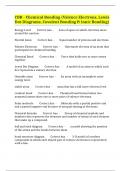Lewis diagram - Study guides, Class notes & Summaries
Looking for the best study guides, study notes and summaries about Lewis diagram? On this page you'll find 183 study documents about Lewis diagram.
All 183 results
Sort by
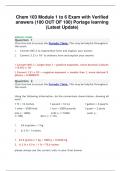 Popular
Popular
-
Chem 103 Module 1 to 6 Exam with Verified answers (100 OUT OF 100) Portage learning (Latest Update)
- Exam (elaborations) • 35 pages • 2024
-
Available in package deal
-
- $20.49
- 15x sold
- + learn more
Chem 103 Module 1 to 6 Exam with Verified answers (100 OUT OF 100) Portage learning (Latest Update) MODULE 1 EXAM Question 1 Click this link to access the Periodic Table. This may be helpful throughout the exam. 1. Convert 845.3 to exponential form and explain your answer. 2. Convert 3.21 x 10-5 to ordinary form and explain your answer. 1. Convert 845.3 = larger than 1 = positive exponent, move decimal 2 places = 8.453 x 102 2. Convert 3.21 x 10-5 = negative exponent = smalle...
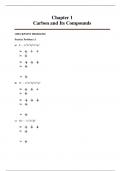 Popular
Popular
-
Solution Manual for Organic Chemistry Mechanistic Patterns Canadian 1st Edition Ogilvie Ackroyd Br
- Exam (elaborations) • 809 pages • 2024 Popular
-
- $48.48
- 1x sold
- + learn more
Chapter 1 Carbon and Its Compounds CHECKPOINT PROBLEMS Practice Problem 1.1 a) S — 1s2 2s2 2p6 3s2 3p4 b) Cl — 1s2 2s2 2p6 3s2 3p5 c) Na+ — 1s2 2s2 2p6 1-2 Copyright © 2018 Nelson Education Limited Practice Problem 1.2 a) Count valence electrons. Build a basic bonding framework and account for electrons used. Add remaining electrons and check for formal charges. The molecule has a lone pair on the nitrogen. All other electrons are bonding electrons. b) Count valence...
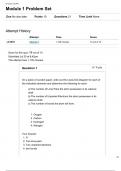
-
CHEM 219 Module 1 Problem Set Principles of Organic Chemistry with Lab Gallaher Portage Learning.
- Exam (elaborations) • 18 pages • 2024
- Available in package deal
-
- $11.99
- 1x sold
- + learn more
CHEM 219 Module 1 Problem Set Principles of Organic Chemistry with Lab Gallaher Portage Learning. Score for this quiz: 10 out of 10 Submitted Jul 25 at 8:42pm This attempt took 1,135 minutes. Question 1 0 / 0 pts Your Answer: On a piece of scratch paper, write out the Lewis Dot Diagram for each of the indicated elements and determine the following for each: a) The number of Lone Pairs the atom possesses in its valence shell. b) The number of Unpaired Electrons the atom possesses in its...

-
Test Bank For Organic Chemistry 9th Edition by John E. McMurry
- Exam (elaborations) • 555 pages • 2023
-
Available in package deal
-
- $33.78
- 2x sold
- + learn more
Chapter 01 - Structure and Bonding 1. Give the ground-state electron configuration for carbon (atomic number 6). 1s22s22px12py1 or 1s22s22p2 2. Give the ground-state electron configuration for fluorine (atomic number 9). ANSWER: POINTS: 1 1s22s22px2 2py2 2pz1 or 1s22s22p5 3. Give the ground-state electron configuration for magnesium (atomic number 12). 1s22s22p63s2 4. How many electrons does silicon have in its valence shell? ANSWER: four POINTS: 1 Exhibit 1-1 Write valid Lewis (elec...

-
Solution Manual for Organic Chemistry Mechanistic Patterns Canadian 1st Edition by Ogilvie Ackroyd Br
- Exam (elaborations) • 811 pages • 2024
-
- $19.99
- 1x sold
- + learn more
Chapter 1 Carbon and Its Compounds CHECKPOINT PROBLEMS Practice Problem 1.1 a) S — 1s2 2s2 2p6 3s2 3p4 b) Cl — 1s2 2s2 2p6 3s2 3p5 c) Na+ — 1s2 2s2 2p6 1-2 Copyright © 2018 Nelson Education Limited Practice Problem 1.2 a) Count valence electrons. Build a basic bonding framework and account for electrons used. Add remaining electrons and check for formal charges. The molecule has a lone pair on the nitrogen. All other electrons are bonding electrons. b) Count valence electrons. Build a bas...
CBR - Chemical Bonding (Valence Electrons, Lewis Dot Diagrams, Covalent Bonding & Ionic Bonding)

-
WGU C175 Final+1+2 Solved Quizzes And Answers!!
- Exam (elaborations) • 9 pages • 2022
-
Available in package deal
-
- $12.99
- 3x sold
- + learn more
What is a broad definition of data? Raw facts that are captured on printed or digital media What are data? Facts that are collected and stored in a database system What is a determining characteristic of unstructured data? It does not follow a data model. Which is true about flat files? They contain no internal hierarchical organization. Which technology has no internal hierarchy? Flat files How were data retrieved before database management systems? Sequ...
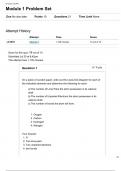
-
CHEM 219 Module 1 Problem Set Principles of Organic Chemistry with Lab Gallaher Portage Learning.
- Exam (elaborations) • 18 pages • 2024
- Available in package deal
-
- $11.99
- + learn more
CHEM 219 Module 1 Problem Set Principles of Organic Chemistry with Lab Gallaher Portage Learning. Score for this quiz: 10 out of 10 Submitted Jul 25 at 8:42pm This attempt took 1,135 minutes. Question 1 0 / 0 pts Your Answer: On a piece of scratch paper, write out the Lewis Dot Diagram for each of the indicated elements and determine the following for each: a) The number of Lone Pairs the atom possesses in its valence shell. b) The number of Unpaired Electrons the atom possesses in its...
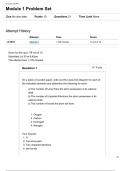
-
CHEM 219 Module 1 Problem Set Principles of Organic Chemistry with Lab Gallaher Portage Learning.
- Exam (elaborations) • 18 pages • 2024
- Available in package deal
-
- $12.99
- + learn more
CHEM 219 Module 1 Problem Set Principles of Organic Chemistry with Lab Gallaher Portage Learning. Score for this quiz: 10 out of 10 Submitted Jul 25 at 8:42pm This attempt took 1,135 minutes. Question 1 0 / 0 pts Your Answer: On a piece of scratch paper, write out the Lewis Dot Diagram for each of the indicated elements and determine the following for each: a) The number of Lone Pairs the atom possesses in its valence shell. b) The number of Unpaired Electrons the atom possesses in its...
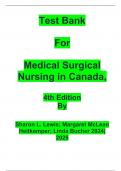
-
Test Bank For Medical Surgical Nursing in Canada, 4th Edition By Sharon L. Lewis; Margaret McLean Heitkemper; Linda Bucher 2024|2025
- Exam (elaborations) • 102 pages • 2024
-
Available in package deal
-
- $21.48
- + learn more
Test Bank For Medical Surgical Nursing in Canada, 4th Edition By Sharon L. Lewis; Margaret McLean Heitkemper; Linda Bucher 2024|2025 The nurse is caring for a client who has heart failure and encourages the client to alternate rest and activity periods to reduce cardiac workload. Which phase of the nursing process is the nurse demonstrating? a. Planning b. Diagnosis c. Evaluation d. Implementation Correct Answer: d. Implementation The nurse is planning care for a c...
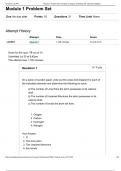
-
CHEM 219 Module 1 Problem Set: Principles of Organic Chemistry with Lab FALL 2023 Portage learning
- Exam (elaborations) • 18 pages • 2023
-
- $22.49
- + learn more
On a piece of scratch paper, write out the Lewis Dot Diagram for each of the indicated elements and determine the following for each: a) The number of Lone Pairs the atom possesses in its valence shell. b) The number of Unpaired Electrons the atom possesses in its valence shell. c) The number of bonds the atom will form. 1. Oxygen 2. Carbon 3. Hydrogen 4. Nitrogen 1. O 2. Two lone pairs 3. Two unpaired electrons 4. two bonds 12/14/23, 8:42 PM Module 1 Problem Set: Principles of Or...

Do you wonder why so many students wear nice clothes, have money to spare and enjoy tons of free time? Well, they sell on Stuvia! Imagine your study notes being downloaded a dozen times for $15 each. Every. Single. Day. Discover all about earning on Stuvia



